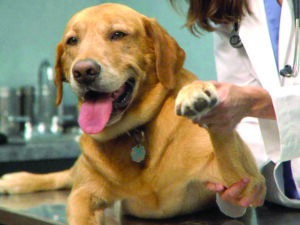By Dr. Beth Leermakers
Eat healthier. Exercise more. Lose weight. These common new years’ resolutions also apply to your dog(s) — especially if your dog suffers from arthritis or you want to prevent or delay the onset of arthritis.

Photo courtesy of RheumatoidArthritis.org
Osteoarthritis, the most common type of arthritis for people and animals, is related to age, or wear and tear. When the cartilage (flexible connective tissue found between the bones in the joints) begins to wear away, the bones in the joints come into direct contact with each other, eventually causing erosion of and further damage to the bone. The weight bearing joints — in the pelvis, knees, ankles and spine — are the most likely to be affected.
Arthritis typically affects older dogs, but your puppy’s diet and exercise play a role in the development of arthritis. Starting healthy habits early gives your dog a better chance at a pain-free retirement.
How to Prevent and/or Manage Arthritis
Feed your puppy a healthy diet. When it comes to puppies, slow and steady growth is the way to go. If you feed your puppy too much or too rich a diet, she may gain weight faster than her bones can handle. This can cause orthopedic problems that result in arthritis. Feeding puppy food (not adult dog food) supports proper puppy growth.
Exercise your puppy properly. Puppies need exercise, but too much running on hard surfaces interferes with proper bone growth, especially in the hip joints. Playing with another puppy may be a better way to go. No, I’m not saying you need to adopt two puppies. Fostering a puppy is a terrific way to give your pup a temporary playmate. Introduce your puppy to water and swimming (a joint-friendly activity).
Increase your adult dog’s physical activity. Take your adult dog out for regular activity (at least four days per week, but more is better). Start with short walks and gradually increase the duration. Be mindful of the heat/humidity in the summer; there is a risk of heat stroke if you walk your dog during the heat of the day and even at night (when the heat index is still 80 degrees at 10 p.m.).
Visit your veterinarian regularly. Take your dog to the vet twice a year for comprehensive examinations to detect signs of arthritis or other conditions that may contribute to it. Early diagnosis and treatment are important for your pup’s quality of life.
Your vet should tell you what subtle signs of pain and discomfort to look for. If you wait until your dog starts limping, there may already be irreversible joint damage.
Ask your veterinarian about dog joint supplements. Dogs may benefit from several supplements, including:
Joint supplements with glucosamine and chondroitin. Although there’s no evidence that supplements prevent arthritis, glucosamine and chondroitin can help slow the loss of cartilage and keep your pet comfortable longer.
Omega-3 fatty acids. EPA and DHA found in fish oil are strong antioxidants that reduce toxic damage from free radicals and fight inflammation.
Some breeds can benefit from joint supplements as puppies. For breeds that are predisposed to joint disease, some veterinarians recommend starting joint supplements as early as eight weeks old.
Hip and knee problems are most common in these breeds:
Toy breeds: Miniature Poodles, Boston Terriers, Chihuahuas, Pugs (knee) and Yorkshire Terriers
Medium to large breeds: American Staffordshire Terrier, Labrador Retrievers, Golden Retrievers, Boxers, American Bulldogs, English Bulldogs, German Shepherds and Mastiffs
Giant breeds: Great Danes, St. Bernards
Elbow problems are most common in English Bulldogs, Welsh Corgis, Dachshunds, Golden Retrievers and Labrador Retrievers.
Shoulder problems are most common in Labrador and Golden Retrievers.
Keep your dog at a healthy weight. Obesity puts more pressure on joints, increasing the wear and tear that leads to arthritis. Controlling your dog’s weight reduces their pain as they age. Weight loss prevents arthritis and reduces the severity of arthritic symptoms in dogs that already have the disease. Your veterinarian will assess your dog’s body condition score and help you develop a healthy eating and exercise plan for weight loss, if indicated.
Keep your dog warm. Arthritis pain is worse in cold weather. Your dog should have a well-padded (orthopedic) bed in a warm indoor location. Self-warming beds are a great choice for short-coated dogs who get cold easily. Dog clothing helps to keep the joints warm. Dress your pup up in a dog sweater or an old sweatshirt altered to fit your fur baby.
By paying attention to your dog’s diet, exercise and weight now, you can help him be more comfortable as he ages. That’s a resolution that’s worth keeping!
Happy New Year!
